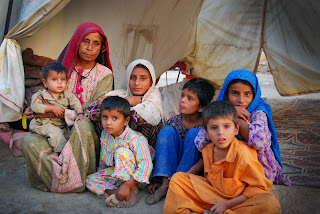By A. Sami Malik
Balochistan, Pakistan, 25 October 2010 – Syeda Khatoon, a grandmother in her fifties, faces a double ordeal: recovering from the flood-related death of her son, Syed Ghulam, and caring for her six grandchildren in the Mangoli camp. Her daughter-in-law died in 2008 while giving birth to her sixth child, leaving Ms. Khatoon to raise her grandchildren. After the massive flooding that began in July 2010, she managed to flee from her native village near Shikarpur, one of the worst flood-affected cities in Sindh Province, across into Dera Murad Jamali, in Balochistan.
“We had to leave our home overnight,” Ms. Khatoon said. “We spent two nights on a roadside as I begged people for a ride to a safer location. No one wanted to carry us as they were all in a hurry trying to save their own lives. We were penniless and I had to sell my granddaughter’s earrings to raise money for transportation to this camp.”
Ms. Khatoon eventually reached the Mangoli camp in Balochistan’s Nasirabad district. She felt extremely vulnerable as the sole head of a family. Many of the 418 families in Mangoli camp were headed by women, because men either perished in the floods or moved to major cities in search of work. Most of the families in the camp had been there for more than two months. Those managing the camp encouraged them to move back to their places of origin, but many villages were still under water. And once they returned home, families faced further hardship, because many houses and belongings were washed away by the floods.
With no source of income, Ms. Khatoon is completely dependent on the camp’s services. She is unsure about the future and extremely worried about the well-being of her orphaned grandchildren.
Balochistan is one of the five provinces in Pakistan. It is the largest but has a low population density. According to Balochistan’s Provincial Disaster Management Authority, 11 districts in the province were affected by the floods - impacting the lives of an estimated 700,000 people, nearly 6 per cent of the total flood-affected population in Pakistan. Schools, health facilities, food and livestock, roads and bridges and other infrastructure were partially or completely damaged.
UNICEF, with the help of its implementing NGO partner, Society for Empowering Human Resource (SEHER), established 11 child-friendly spaces in the Mangoli camp. These places are safe havens for children. Children can play and learn through playful activities and a counsellor is available to help them overcome their trauma. The child-friendly spaces in Mangoli are among the 64 fixed and 12 mobile child-friendly spaces in Balochistan. Nearly 6,000 children benefit from the services offered. Child protection committees have also been established to support these places within camps for internally displaced persons.
Two women-friendly spaces were also established in the camp to provide psychosocial support and privacy for breastfeeding women. More than 600 women have benefited from these this service.
“All we have in this camp is this tent,” said Syeda Khatoon. “Sometimes we don’t even get food on time. But I am happy that five of my grandchildren go to the centre [the child-friendly space]. They are learning how to read and write, and when they come back, they keep talking about it. I don’t understand any of what they talk about, but I know that they are happier than before.”
One of Ms. Khatoon’s grandchildren, Naseeba, 12, had never been to school prior to arriving in Mangoli. Exposure to the child-friendly environment and learning through playful activities has been an eye-opener for her. She shows keen interest in all activities and learning as well as the games.
“We study in this centre,” Naseeba said, “and do whatever the Baji [teacher] tells us to do – read, write or play. We then go home, have lunch and come back to the centre. I skip a rope, play football and other games. I wish that when I go back home there is a centre like this where I could study.”
Psychosocial support is a strong force for normalizing the lives of women and children affected by the floods. UNICEF helped SEHER hire Arifa, a qualified psychosocial counsellor who moves among the various child-friendly spaces. The children have developed a strong bond with her.
“The fear of the floods is still on their minds,” said Arifa. “By helping them to play games, giving them special attention and talking to them, we try to help them overcome that fear. We provide them counselling, as a result of which they are gradually coming out of the trauma and returning to a normal life. The smile, happiness and innocence, which should be on every child’s face, are gradually coming back to these child




